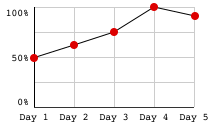It is always divergent.
Understanding the Divergence of Harmonic Series Unravel the mystery of harmonic series divergence. Learn why this concept is crucial in mathematics, explore its proofs, and discover its wide-ranging applications in various scientific fields.
Free to Join!
Easily See Your Progress
 We track the progress you've made on a topic so you know what you've done. From the course view you can easily see what topics have what and the progress you've made on them. Fill the rings to completely master that section or mouse over the icon to see more details.
We track the progress you've made on a topic so you know what you've done. From the course view you can easily see what topics have what and the progress you've made on them. Fill the rings to completely master that section or mouse over the icon to see more details.Make Use of Our Learning Aids
Earn Achievements as You Learn
 Make the most of your time as you use StudyPug to help you achieve your goals. Earn fun little badges the more you watch, practice, and use our service.
Make the most of your time as you use StudyPug to help you achieve your goals. Earn fun little badges the more you watch, practice, and use our service.Create and Customize Your Avatar
 Play with our fun little avatar builder to create and customize your own avatar on StudyPug. Choose your face, eye colour, hair colour and style, and background. Unlock more options the more you use StudyPug.
Play with our fun little avatar builder to create and customize your own avatar on StudyPug. Choose your face, eye colour, hair colour and style, and background. Unlock more options the more you use StudyPug.
It is always divergent.
Introduction: Understanding the Divergence of Harmonic Series
Harmonic series are fascinating mathematical sequences that play a crucial role in various fields of mathematics and physics. These series, defined as the sum of reciprocals of positive integers, have intrigued mathematicians for centuries due to their unique properties. One of the most intriguing aspects of harmonic series is their divergence, a concept that often puzzles students and enthusiasts alike. To shed light on this phenomenon, we've prepared an enlightening introduction video that explores why the harmonic series diverges. This video serves as an excellent starting point for understanding the underlying principles and mathematical reasoning behind this divergence. By delving into the question "Why does the harmonic series diverge?", we'll uncover the fascinating properties that make these series so special. Whether you're a student grappling with this concept or simply curious about mathematical oddities, this exploration of harmonic series divergence promises to be both informative and engaging.
Here are some frequently asked questions about the divergence of harmonic series:
1. Why do harmonic series always diverge?
Harmonic series always diverge because the sum of their terms grows without bound. This can be proven using the grouping method, where we show that the series is greater than an infinite sum of 1/2, which clearly diverges. The slow rate of decrease in the terms is not sufficient to ensure convergence.
2. Does the harmonic sequence diverge or converge?
The harmonic sequence itself (1, 1/2, 1/3, 1/4, ...) converges to 0, as the terms approach 0 as n approaches infinity. However, the harmonic series, which is the sum of these terms, diverges. It's important to distinguish between the sequence of terms and the series of their sum.
3. Does alternating harmonic series diverge?
No, the alternating harmonic series (1 - 1/2 + 1/3 - 1/4 + ...) actually converges. This is an example of how alternating the signs can change the convergence behavior of a series. The alternating harmonic series converges to the natural logarithm of 2.
4. How do you know if a series diverges?
There are several tests to determine if a series diverges: - The nth Term Test: If the limit of the nth term isn't 0, the series diverges. - The Integral Test: Compare the series to an improper integral. - The Comparison Test: Compare the series to a known divergent series. - The Limit Comparison Test: Compare the limit of the ratio of terms with a known series. - The Ratio Test or Root Test: Examine the behavior of consecutive terms.
5. What is the convergence rule of the harmonic series?
The harmonic series does not have a convergence rule because it diverges. However, for p-series (1/n^p), of which the harmonic series is a special case (p=1), the convergence rule is: The series converges if p > 1 and diverges if p 1. This rule helps contextualize the harmonic series' divergence within the broader family of p-series.
Understanding the divergence of harmonic series is a crucial concept in advanced mathematics, particularly in calculus. To fully grasp this topic, it's essential to have a solid foundation in several prerequisite areas. One of the most fundamental concepts to master is the convergence and divergence of normal infinite series. This knowledge forms the basis for understanding how series behave as they extend infinitely, which is directly applicable to the harmonic series.
Another critical prerequisite is the study of convergence and divergence of geometric series. While the harmonic series is not geometric, understanding the behavior of geometric series provides valuable insights into series convergence and divergence in general. This knowledge helps in recognizing patterns and applying similar analytical techniques to the harmonic series.
The comparison and limit comparison test is another essential tool in the analysis of series convergence. These tests are particularly useful when dealing with the harmonic series, as they allow us to compare its behavior with other known series. By mastering these comparison techniques, students can better understand why the harmonic series diverges and how it relates to other series.
Lastly, familiarity with the alternating series test is beneficial, especially when considering variations of the harmonic series. While the standard harmonic series diverges, the alternating harmonic series converges, and understanding this test helps explain this fascinating difference. It also introduces students to the concept of conditional convergence, which is a key aspect of series analysis.
By thoroughly understanding these prerequisite topics, students will be well-equipped to tackle the complexities of the divergence of the harmonic series. The harmonic series serves as a perfect example of how seemingly simple series can exhibit surprising behavior, making it a cornerstone in the study of infinite series in mathematics. Its divergence, despite the terms approaching zero, highlights the subtle nature of series convergence and the importance of rigorous mathematical analysis.
Moreover, the study of the harmonic series and its divergence has far-reaching applications in various fields of mathematics and physics. It plays a role in understanding certain physical phenomena, probability theory, and even in some aspects of number theory. Therefore, a solid grasp of the prerequisite topics not only aids in understanding the harmonic series itself but also prepares students for more advanced mathematical concepts and their real-world applications.



